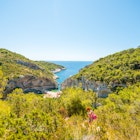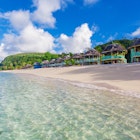
The word ‘archipelago’ comes from the Greek ‘arkhi’ (chief) and ‘pegalos’ (sea). Originally, it was a name only for the Aegean Sea, that island-speckled spur of the Mediterranean between Greece and Turkey.
Now, the word describes any chain of islands – but just as it did when Odysseus supposedly set sail from Troy to explore the original, the thought of hopping from one island to another still stokes a sense of wanderlust.
After all, where else can travellers find such a range of one-off experiences so close to each other? Simply put, archipelagos condense adventures. So perhaps it’s time to set off on your own odyssey through one of them. Here are some ideas to ignite your imagination.
- placement: fullWidth
- path: articles/in-content-top
- possible size: [970, 250], [970, 90], [728, 90], [300, 250], [320, 50], [1, 1],
- targeting:
{ "url": "an-island-hoppers-guide-to-archipelagos-of-adventure" }

Galápagos Islands, Ecuador
In a nutshell: The original bucket list-topper for wildlife watchers
Salt-sneezing iguanas, blue-footed boobies, multi-hued Sally Lightfoot crabs… you’ve seen the Galápagos’ iconic inhabitants on TV so many times that you know them as well as the much less colourful critters in your own backyard. In this case, however, familiarity has not bred contempt: seeing with your own eyes the unique wildlife that shaped Charles Darwin’s theory of evolution is a spellbinding travel experience. Most visitors stay aboard a cruise ship bound for several islands, but you can also stay at a hotel on one of the larger ones and take day trips instead.
Go: TAME, Avianca and LAN fly from Quito and Guayaquil.

Haida Gwaii, Canada
In a nutshell: Intriguing culture amid ancient rainforest, plus marine life in abundance
Often dubbed ‘Canada's Galápagos', the wild, wet islands of Haida Gwaii, which lie about 90 miles off the craggy coast of British Columbia, cast a powerful spell, combining a vibrant First Nations culture with some of the oldest, most pristine rainforests on earth. After visiting the Haida Heritage Centre in the north, take a boat or hop on a plane to Gwaii Haanas National Park in the south, a vast wilderness of spruce and cedars that abounds with endemic fauna and flora; and keep ‘em peeled for the whales, orcas and sea otters flourishing in the islands’ protected coastal waters.
Go: Air Canada flies from Vancouver; BC Ferries run services from Prince Rupert.

Ogasawara Archipelago, Japan
In a nutshell: Tropical balm for the soul, seriously off the beaten track
It is difficult to reconcile the electrifying, high-tech metropolis of Tokyo with the edge-of-the-world tranquillity of the Ogasawara Archipelago – and yet, officially, these polar opposites occupy the same Japanese prefecture. Stressed-out Tokyoites and anyone else looking to unwind will find the long ferry trip to this necklace of jade jewels in a dolphin-dotted sea more than worthwhile. Yes, these islands exude a sense of calm, but that doesn’t mean there’s nothing to do: in an environment this unspoiled, you won’t be surprised to hear that Ogasawara’s forests and reefs simply teem with life just waiting for you to hike or swim amongst it.
- placement: fullWidth
- path: articles/in-content-middle
- possible size: [970, 250], [970, 90], [728, 90], [300, 250], [320, 50], [1, 1],
- targeting:
{ "url": "an-island-hoppers-guide-to-archipelagos-of-adventure" }
Go: There's only one way – the 24-hour ferry from Tokyo.

Comoros Islands
In a nutshell: Islamic culture plus castaway charm
The unheralded trio of Grande Comore, Mohéli and Anjouan is unlike anywhere else in the Indian Ocean: in contrast to near-ish neighbours the Seychelles, the Comoros, an Islamic nation at the top of the Mozambique Channel, welcomes just a few thousand visitors a year. African, Arabic, Malagasy and French influences intermingle to intoxicating effect here, as do the fragrances of tropical flowers, which gave this old spice trading post its other name: the ‘perfumed islands’. Stroll the medina of Moroni, hike smouldering Mt Karthala in the south of Grande Comore, and then set sail for the even more remote outposts of Mohéli and Anjouan, home of endangered turtles and fruit bats respectively.
Go: Kenyan Airways, Air Tanzania and Air Madagascar fly to Grande Comore.

The Azores, Portugal
In a nutshell: Adventure playground for adults in the mid-Atlantic
Thrillseekers need look no further than these nine volcanic islands in the middle of the Atlantic. Geology and geography have combined to produce an adrenaline junkie’s fantasy: sail, dive, hike, surf, rappel, canyon, kayak, paraglide, mountain bike – it’s all happening in this autonomous region of Portugal. The Azores’ location also ensures world-class whale watching and, should you fancy some culture amid all that action, the ancient vineyards of Pico and old town of Angra do Heroismo on Terceira are both world heritage sites. Phew.
Go: TAP, Ryanair, Delta and others fly from destinations throughout Europe and the US.

Bacuit Bay, the Philippines
In a nutshell: Brochure-friendly vision of limestone cliffs and emerald lagoons
Composed of more than 7000 tropical islands, the entire Philippines qualifies as a castaway’s daydream. But the long sliver of Palawan province, the inspiration for Alex Garland’s bestselling novel The Beach, is certainly one of the highlights – and within Palawan itself, the sheer limestone cliffs enclosing the jade and turquoise shallows of Bacuit Bay draw the most determined paradise-seekers. El Nido is the gateway to this glimmering waterworld, which is best explored by sea kayak. Expect secret lagoons, exquisite beaches and some of Southeast Asia’s best snorkelling.
- placement: native
- path: articles/in-content-native
- possible size: [f, l],
- targeting:
{ "url": "an-island-hoppers-guide-to-archipelagos-of-adventure" }
Go: Airswift flies from Manila and other Filipino destinations.

Orkney, Scotland
In a nutshell: Enough time-travelling potential to make Dr Who's head spin
Strange as it seems when you consider its location from a contemporary perspective, this wind-buffeted spot off northeast Scotland was once a hub of Stone Age civilisation. Skara Brae, the Ring of Brodgar and other atmospheric ruins testify to that, and these flat, fertile islands also retain traces of later epochs, from the Bronze to the Viking Age, not to mention a fascinating footnote of war-time history, when the natural harbour of Scapa Flow sheltered the British Navy during WWI and WWII. Aside from this multi-layered heritage, Orkney also attracts nature lovers with shell-strewn, seal-frequented beaches and walks along sandstone cliffs echoing with the screeches of huge seabird colonies.
Go: Flybe flies from most major Scottish cities; Northlink Ferries runs services from Aberdeen, plus there are shorter seasonal routes.

The Solomon Islands
In a nutshell: Barefoot beauties and undersea marvels in the South Pacific
This part of the world specialises in desert-island getaways. Many of them boast resorts with all the trimmings, but the Solomon Islands offers a different vibe: here, you’re more likely to stay in a humble guesthouse than an overwater bungalow, and the chief pleasure comes from experiencing a place that feels pleasingly lost in time. It's surprising given that, like some of their neighbours, the Solomons enchant the senses with luxuriant forests, indigo-hued lagoons and, most of all, marvels beneath the waves. It’s the latter that lures divers, who come for the kaleidoscopic coral and WWII wrecks; but, what with jungle hikes to secret waterfalls, serious surfing and snapshots of Melanesian culture on offer, there are reasons enough above the water too.
Go: Solomon Airlines, Virgin Australia, Fiji Airways and others fly from Australia, Fiji, Papau New Guinea and Vanuatu.

Svalbard, Norway
In a nutshell: a taste of the North Pole for mortals
Short of enrolling for a proper polar expedition, a trip to these ice-encrusted islands in the North Atlantic is one of the best ways to get a feel for life inside the Arctic Circle. And what a life it is: more polar bears than people roam this land of creaking glaciers, where the seasons dictate what’s on offer. In summer, pick from dozens of boat trips, hiking adventures and dog-sledding tours, and explore this wild archipelago under the glow of the midnight sun; those dauntless dogs still run in winter, but snowmobiling is the fastest way to traverse the polar night, with tour companies offering multi-day cross-country ski excursions.
Go: SAS and Norwegian fly from Tromsø or Oslo; otherwise, you’ll need to catch a cruise from the mainland.
- placement: fullWidth
- path: articles/bottom
- possible size: [970, 250], [970, 90], [728, 90], [300, 250], [320, 50], [1, 1],
- targeting:
{ "url": "an-island-hoppers-guide-to-archipelagos-of-adventure" }
Explore related stories




 Beaches15 of the world's most stunning islands for every kind of traveler
Beaches15 of the world's most stunning islands for every kind of travelerNov 25, 2022 • 10 min read
 BeachesThe 9 best beaches in Ecuador are top spots to surf, party and chill
BeachesThe 9 best beaches in Ecuador are top spots to surf, party and chillSep 29, 2022 • 9 min read

 BeachesScotland’s best beaches offer wildlife watching, water sports and windswept walks
BeachesScotland’s best beaches offer wildlife watching, water sports and windswept walksJul 27, 2022 • 7 min read



